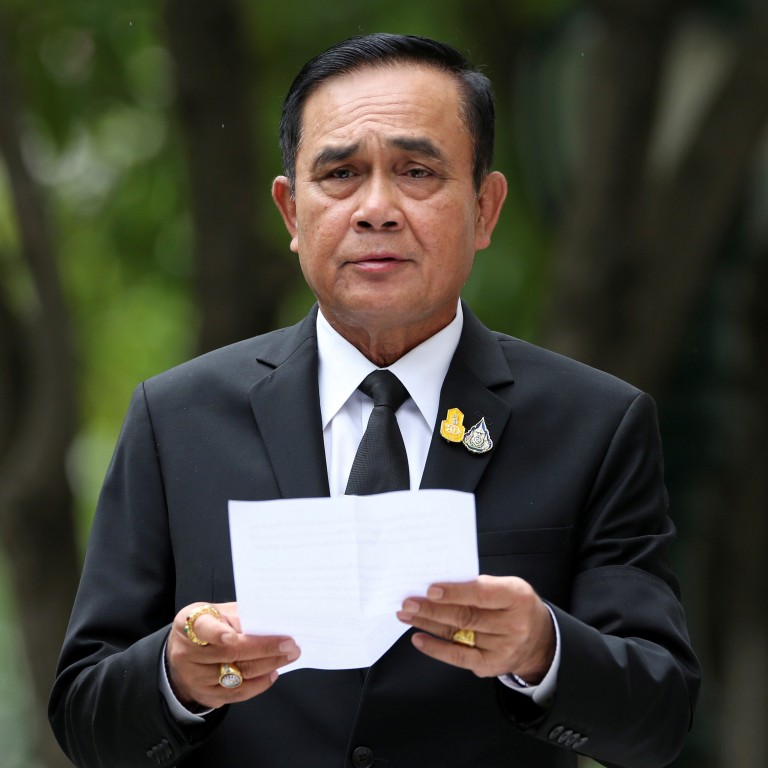
Thailand protests: PM Prayuth Chan-ocha will lift state of severe emergency to ‘de-escalate’ unrest
- Protesters have demanded Prayuth’s resignation as well as democratic reforms and new elections
- They have also issued an unprecedented challenge to the influence of the country’s monarchy
“I will make the first move to de-escalate this situation,” Prayuth said during a taped televised address. “I am currently preparing to lift the state of severe emergency in Bangkok and will do so promptly if there are no violent incidents.”
Democracy protesters have massed daily in the capital since last week, flouting the emergency edict prohibiting gatherings of more than four people.
Explainer: why are there protests in Thailand and what will happen next?
Despite Prayuth’s offer to lift the state of emergency in the capital, protest leader Tattep Ruangprapaikitseree reiterated the movement’s demand for him to resign.
“Prayuth must resign first and that is the easiest thing to do,” he said.
‘Government’s got no game’: are Thai protesters gaining the upper hand?
As Prayuth spoke, tens of thousands of protesters marched towards his office at Government House to demand his resignation as well as the lifting of the emergency measures and release of dozens of activists arrested in a crackdown.

01:25
Thailand ‘preparing to lift state of emergency’ as protests continue
A line of around 150 riot police and barbed wire stopped the crowd about 2km from their target, although protesters soon managed to push their way through. As they kept up their chants, one group even waved a giant “resignation letter” for the premier from the top of buses parked just a couple of hundred metres away from the building’s gates.
“My duty as a national leader is to look after the needs of everyone in this country, and to try and balance sometimes very different and very extreme views so that we can all live together in this one land that belongs to us all and which we all love,” Prayuth said during his address.
“I must lead the country based on the greater good of society, and the needs of silent people, too. I must lead the country based on principle, the law, and the will of parliament as the ultimate representative of the people.
Milk Tea Alliance: are young Thais turning on China over Hong Kong?
“The only way to a lasting solution for all sides that is fair for those on the streets as well as for the many millions who choose not to go on the streets, is to discuss and resolve these differences through the parliamentary process.
“It is a slow process, but it is one that best avoids injury to our nation. We must show the maturity and patience to take the middle path.
“The protesters have made their voices and views heard. It is now time for them to let their views be reconciled with the views of other segments of Thai society through their representatives in parliament.”

The website was one of four media under investigation for violating computer crimes laws and the emergency decree aimed at curbing the civil unrest. But the court revoked the ruling and allowed all four media, including The Standard, The Reporters and Prachathai, to continue reporting freely.
The court said there “must be specific content that is illegal and authorities cannot shut down a whole page or URL”, Voice TV’s lawyer Winyat Chartmontri told reporters.
“The court said people’s freedom [of] communication must be protected and media outlets cannot be shut down. Press freedom is very crucial,” he said, adding that today’s decision cannot be appealed.
Voice TV staff would continue their reporting duties “fully, professionally and factually”, said a statement on the outlet’s website.
Sunai Phasuk from Human Rights Watch hailed the court decision but warned journalists were still at risk.
Their presence on the ground at protests “is considered by police as violating the emergency decree. They are not out of the woods yet”, he said.
An activist, 26-year-old Nat, said she was happy the court ruling about Voice TV had been overturned.
“We will still have a TV channel that reports the truth,” she said, urging for the freedom to protest to be returned too.
Additional reporting by Reuters

.png?itok=arIb17P0)